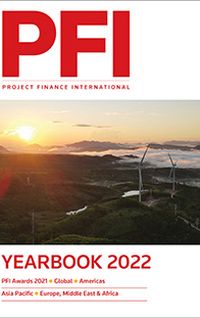Bank of the Year – Societe Generale
Societe Generale had a very strong year in Europe this year, well ahead of its main rivals in terms of deals done and, crucially, in terms of a growing range of unique bespoke financings that will, hopefully, become mainstream one day. It has lead-arranged 50 deals in 2021 to-date, well ahead of the pack.
The bank advised on the first volume risk project financing for an electric vehicle (EV) charging network, the €124m EV Cars green loan financing in France. Meridiam owns EV Cars with its subsidiary Allego. The deal is backed by supermarket chain Carrefour, which selected Meridiam to install an EV charging network across its premises. Clearly, the push for EV charging is growing. A project finance structure is now in place to take the sector forward.
The bank is working on a gas-fired power project that will send carbon into the first carbon capture and storage (CCS) project awarded in the UK on the East Coast of England. The project is being developed by BP, Equinor and TotalEnergies. And it is advising on the first hydrogen-based green steel financing in Europe, the H2GS project in Sweden.
The bank is working on financings for another coming sector, interconnectors – the NeuConnect scheme from Germany to the UK and the Greenlink scheme from Ireland to the UK. These deals are currently being finalised and will close in the new year.
The bank has been strong in the European fibre space. This year it advised on the €1.65bn financing for Unsere Grune Glasfaser, the joint venture in Germany between Allianz and Telefonica, aiming to deploy fibre in remote areas. And it advised on the €1.26bn transaction for the Orange Concessions joint venture in France. As part of the deal Orange sold 50% to EDF Invest, CNP Assurances and Caisse des Depots with SG advising on the staple and the eventual financing.
The team is led by global heads Olivier Musset, energy, and Herve Le Corre, infrastructure, in Paris. Lenaig Trenaux has recently been appointed head of mining, metals and industries.
Deal of the Year – Enfinium
There have been plenty of outstanding M&A deals in the energy and infrastructure sector in 2021, as in previous years, but one stuck in the mind for what happened after the deal was done – Enfinium. Most M&A deals involved the acquisition followed perhaps by a refinancing, and then the asset sits on the book. For Enfinium, the UK waste company formally known as Wheelabrator, the deal was struck at the start of the year, was debt financed, then two projects were project-financed during the year and then at year-end the original acquisition debt was refinanced.
Of course, First Sentier Investors (FSI) was following the development plans Wheelabrator had put in place before-hand, but it took those plans, put its own financing stamp on them and financed the new schemes in a very efficient and timely manner, particularly for the waste-to-energy (WtE) space.
FSI initially bought both the waste assets of SSE for £995m in 2020 for 20x Ebitda. The assets amounted to a 50% stake in the Multifuel joint venture with Wheelabrator. This put FSI in pole position to win the Wheelabrator UK assets being sold by MIRA, which is duly did with a bid said to be around £2bn. Jefferies and Macquarie Capital were financial advisers to FSI and Latham & Watkins was lead legal counsel. Credit Suisse and JP Morgan advised Wheelabrator UK and Linklaters was legal counsel.
FSI then put a £1.65bn platform acquisition financing in place at the start of the year, which repaid the project debt on Wheelabrator’s WtE assets and on the Multifuel joint venture. MUFG, Credit Agricole, Santander and Natixis underwrote the five-year bullet loan. The funders that joined the deal were institutional clients of HSBC and NatWest, Bank of East Asia, KDB, KEB Hana, Sabadell, SEB, Siemens, OCBC, Royal & Sun Alliance and Swiss federal pension fund Publica.
Once done, FSI, which was renamed Wheelabrator Enfinium headed by CEO Julia Watsford, concentrated on project financing three new WtE plants – Skelton Grange near Leeds, West Bromwich and a significant expansion at the Kemsley plant in Kent – an ambitious programme in itself. One hiccup in the year was that the Kemsley expansion was turned down by the government, although it did allow the existing plant to be expanded.
That left Skelton Grange and West Brom. Unlike previous Wheelabrator deals, FSI decided against long-term project financings and decided on short-term construction financings, which will be taken out by the platform financing once the assets are built.
The 410,000tpa, 49MW Leeds scheme was financed by a £450m seven-year financing from the lead banks on the platform – Credit Agricole, MUFG, Natixis and Santander. HZI is the contractor. Deloitte and Ashurst advised Enfinium and Linklaters advised the lenders. The similar West Brom scheme was financed by the same four banks plus ABN AMRO. MUFG and Ashurst advised Enfinium and Linklaters advised the lenders.
At year-end the borrower was back in the capital markets with its long-term platform refinancing, a £450m 10-year bank tranche plus £250m of ancillaries and a £1.2bn 26-year institutional tranche. The banks include Barclays, Caixa, CIBC, Credit Agricole, HSBC, NAB, Natixis, NatWest, MUFG, Santander and SEB. Institutions include Aberdeen, AIG, Apollo, Aviva, Canada Life, MetLife, New York Life, Pacific Life, PIC, Principle, Railpen and Vantage. Jefferies and Santander were the financial advisers on the deal while Latham & Watkins advised the sponsor and Weill advised the lenders. PMC worked on the hedging.
FSI, formerly Colonial First State Global Asset Management in Australia and First State Investments elsewhere, has always been a strong player in the infrastructure space in the traditions of the Australian investment community. Its firepower was boosted when it was bought from CBA by another leading energy and infra player, MUFG, in 2019. In the UK, FSI is headed by Gary Colton, who joined in September 2020 from M&G, where he was the chief operating officer (COO) and a member of the executive team.
Data Deal of the Year – Data4
French data centre (DC) operator Data4 raised a €620m debt package refinancing existing sites, doubling the size of its Paris DC to 200MW, and supporting expansion at its other European campuses.
Deutsche Bank, Societe Generale and SMBC acted as mandated lead arrangers, global syndicate, active bookrunners and original lenders on the financing. The banks syndicated in 10 other lenders including commercial banks Sabadell, Santander, BNP Paribas, ING, KfW IPEX-Bank, and NIBC.
A group of four institutional investors including La Banque Postale Asset Management, French reinsurance company Scor, Canadian life insurer Sun Life Financial and Macquarie Infrastructure Debt Investment Solutions (MIDIS) were also syndicated into the deal.
Paris-based Data4’s package of six-year debt includes a €290m term loan tranche that refinances existing indebtedness and transactions costs. It has a further €310m delayed-draw term loan for use towards capex projects in the coming four years, and a €20m revolving credit facility.
Each tranche saw participation from the entire lender group. All of the debt is senior. Long-term contracts back the loan, which has a debt/equity split of 62/38. Total project cost is €1bn with the deal covering 19 of Data4’s DCs throughout France, Italy, Luxembourg and Spain. AXA IM - Real Assets is Data4’s main shareholder with an 80% stake. It sold a 20% stake in May 2020 to Danish pension fund PFA for €201m.
Data4 aims to further develop the number of DCs on its campuses at Marcoussis in France, and in Milan and Madrid – adding a further 23 new DCs. The package also supports the doubling of power capacity at Data4’s 100MW Paris campus.
Some of the cash will be used for expansion plans targeting Central Europe and Scandinavia. Data4 in the summer said it would expand into Poland with plans for a 50MW campus financed with the new debt. The project will cost up to €200m and should be ready by 2025.
Data4 was advised by French law firm De Pardieu Brocas Maffe. Lenders received legal advice from White & Case.
The debt raising was particularly relevant in the context of the Covid-19 pandemic, which has highlighted a growing focus on data storage and connectivity. These themes were under the spotlight this year and last with the sharp increase of home working and e-commerce.
Data4 operates 22 DCs throughout France, Italy, Spain and Luxembourg with power totalling 209MW. It has potential for developing 41 DCs. As a result of the debt raising the company has access to almost €1bn to fund its growth through to 2024, in which it aims to double its turnover in five years.
Fibre Deal of the Year – Orange Polska
French telecoms company Orange’s Polish subsidiary Orange Polska and Dutch pension fund APG closed a Z3.15bn (€653m) plus Polish zloty non-recourse debt package backing the rollout of fibre to 1.7m households in Poland.
Orange’s 50%-owned Polish subsidiary Orange Polska is building an open network while targeting low and medium-density areas to gain both retail and wholesale customers. It ran a competitive process to select APG as a financial partner for the rollout.
Warsaw-headquartered Orange Polska set up a stapled financing with Santander which led the lender group underwriting the facility. They included Santander, BNP Paribas, ING, Societe Generale, and the European Investment Bank (EIB). Lenders including KfW IPEX, mBank, Bank Pekao, PKO BP, BGK Bank and Raiffeisen Bank International joined through the syndication process.
The package includes a Z3bn term loan for the rollout and a Z150m revolver for working capital. It is structured as a seven-year hard mini-perm financing. The floating debt is based on the three-month Warsaw interbank offered rate (Wibor) with a margin on top. Years six and seven see a cash sweep kick in with the loan terms encouraging refinancing.
Dubbed Project Nebraska, the deal was financed off Orange’s balance sheet in a fibreco special purpose vehicle – Swiatlowod Inwestycje (SI). Orange Polska and APG are committing Z300m of equity each between 2023 and 2026.
The deal values the fibreco at Z2.75bn on a debt and cash-free basis. APG paid an initial Z887m on closing with the remaining Z487m between 2022 and 2026 conditional on the delivery of the network.
Orange Polska will sell use of the network to wholesale clients. Parent company Orange will pay to use the network, although it doesn’t have a volume commitment or a minimum guaranteed level of services that it will buy.
Completion of the rollout is expected by 2025, with Orange Polska guaranteeing network construction within a fixed budget. The company at the beginning of July transferred 672,000 fibre-to-the-home (FTTH) links to SI as part of the deal. SI will gain wholesale access to more than 170,000 Orange Polska customers.
APG is taking a 50% stake in SI, although Orange Polska will have the option to buy about 1% of the JV company and gain control in 2027–2029. The deal reached close on October 21.
Orange Polska was advised by Santander on the finance package and by Lazard for the transaction with APG. The company received legal advice from Linklaters. Lenders were advised by Norton Rose Fulbright. Freshfields Bruckhaus Deringer and Rymarz Zdort advised APG. PwC was tax adviser alongside Mazars as model auditor and Marsh as lender’s insurance adviser. Arthur D Little was technical and commercial adviser.
Other Orange Polska shareholders include Nationale-Nederlanden Open Pension Fund with just over 5%. Almost 45% is free-float listed on the Warsaw stock exchange.
M&A Deal of the Year – Open Fiber
Macquarie Asset Management completed its acquisition of a 40% stake in Italian broadband company Open Fiber in early December, at the same time raising an up to €10bn debt package to refinance debt and provide capital for further rollouts. Macquarie closed on the acquisition of a 50% stake in Open Fiber for €2.12bn from Italian utility Enel, concurrently selling on 10% to state lender CDP, bringing the lender’s entire holding to 60%.
Lenders include Banco BPM, Santander, BNP Paribas, Credit Agricole, ING, Intesa San Paolo, Societe Generale, and UniCredit as global coordinators, bookrunners and MLAs. The seven-year debt refinances existing project financing of €4.1bn, improving terms and extending the maturity to 2028, as well as providing around €3bn for network expansion.
Following the change of control, Open Fiber’s new board of directors approved the 2022–2031 business plan. Total investment under the 10-year plan is approximately €11bn, to be met by the new debt and cash generation.
The plan outlines Open Fiber’s strategy to extend very high capacity network (VHCN) coverage to so-called "grey areas" where there is only one network operator and no one else planning to develop a “next generation access” network, the company said.
Open Fiber intends to bid in all of the Ministry for Technology & Digital Transition’s upcoming calls for tenders under the Italy 1 Giga Plan, and will be able to draw on a further €2.8bn credit line. The tenders to provide coverage for outstanding “grey areas” are expected in June 2022.
The company was advised by Evercore and law firm White & Case. It aims to cover 24 million households, up from 13 million today.
Open Fiber expects margins to exceed 75% at the end of the plan with more than €2bn in revenues. Break-even is forecast in 2026. More than 200 national and international operators have entered agreements with the company for the use of its network.
Open Fiber in August 2018 raised its landmark €3.5bn seven-year project financing before adding another €675m to its project loan in October 2020.
Italy’s government has been trying to negotiate a merger between Telecom Italia (TIM) and Open Fiber to create a national company. CDP is TIM’s second largest shareholder after French media firm Vivendi, which could ease plans to merge the two internet companies.
PPP Deal of the Year – D4
A French team of Vinci and Meridiam reached financial close at the end of April on the €520m D4 motorway PPP in Czech Republic – the country’s first successful transport PPP. KCB subsidiary CSOB, UniCredit, Siemens Bank, SMBC, Societe Generale, DZ Bank, NordLB, KfW IPEX and Munich Re asset manager MEAG were the lenders on the €475m 27.5-year dual-currency debt package, supplemented by a €50m equity bridge. Pricing came in around 200bp.
Revenues for the concessionaire will be derived from availability payments, rather than tolls. Half of the payments will be in euros and half in koruna, with indexation covering half of each.
Financial adviser PwC credits the success of the financing to the government “not re-inventing the wheel and widely replicating successful and market tested precedents” in, for example, neighbouring Slovakia, where Vinci had previous success with the R1 Highway PPP.
CMS was the sponsors’ legal adviser and ESTER worked on hedging. Erste Group’s Ceka Sporitelna was financial adviser to the government, with White & Case the legal adviser and Obermeyer Helika and Siebert & Talas the technical advisers. The lenders were advised by law firms Linklaters and Kinstellar, and technical adviser Infrata.
The project itself consists of building a 32km stretch of road connecting southern and central Bohemia – including four upgrade junctions and 44 bridge structures – as well as converting and operating an existing 17km stretch over a 28-year concession including three years and eight months for construction. Works began in May. The road will be equipped with state-of-the-art technologies that will, among other things, guarantee a high level of road safety and comfort for motorists and improve traffic conditions and traffic flow, thus reducing congestion and pollution.
Offshore Wind Deal of the Year - Courseulles-sur-Mer
EDF Renewables, Enbridge and wpd raised a €2.14bn debt package backing the 448MW Courseulles-sur-Mer (CSM) wind project off the coast of France. BNP Paribas, Credit Agricole and SMBC acted as MLAs, underwriters and bookrunners, syndicating 15 lenders into the project’s 20-year debt package.
Lenders include Natixis, Standard Chartered, BayernLB, Siemens Bank, UniCredit, CaixaBank, CIBC, Credit Industriel et Commercial, Helaba, KfW IPEX, La Banque Postale, Mizuho, Rabobank, Societe Generale and BPI France.
The European Investment Bank (EIB) previously granted a €350m credit line to CSM. The EIB’s financing is guaranteed by the European Fund for Strategic Investments (EFSI).
The €2.14bn package includes term loan, standby, debt service reserve and ancillary facilities, as well as an equity bridge loan. CSM’s debt raising was more than two times subscribed, sources said at the time.
Financial close occurred in March with the syndication completed on April 5. Debt pricing was lower than on EDF’s €2.4bn 498MW Fecamp offshore wind deal, a source said, with the “pandemic related noise” now behind the market. Societe Generale, BNP Paribas and Credit Agricole led the syndication of Fecamp last summer with pricing at pre-Covid-19 levels of about 150bp.
CSM is 10km from the Bessin coastline and has a 20-year power purchase agreement (PPA) with the French government from June 2018, paying about €150 per MWh. Construction will take 3.5 years and commissioning is expected in 2024. The project will use 64 Siemens Gamesa 7MW turbines on monopile foundations. Saipem is construction contractor.
BNP Paribas was financial adviser to the sponsors alongside legal advisory services from Clifford Chance. Linklaters advised the lenders. EDF Renewables has a 42.5% stake in CSM, followed by Enbridge with 21.7% and Canada Pension Plan Investment Board with 20.8%. The remaining 15% is held by wpd.
EDF Renewables and Enbridge hold their stakes in the project via the joint venture Eolien Maritime France (EMF). CSM is the third and final project in a series of offshore wind developments awarded to EMF in 2012. It follows the Saint Nazaire and Fecamp deals, closed in 2019 and 2020, respectively.
ESG Deal of the Year – Karapinar YEKA Solar
Turkey's Kalyon reached financial close on its 1GW Karapinar YEKA solar farm, following November’s signing of the US$812m debt package. The project has had to overcome more than most to get over the line, including multiple currency crises, political uncertainty, a partner exit, and a global pandemic. These events managed to slow, but not prevent, the landmark project’s financing four years after it was awarded as the first scheme under Turkey’s YEKA programme.
Kalyon and its then partner, South Korea's Hanwha Q Cells, submitted the lowest bid of US$0.0699 per kWh for the project at Karapınar in the central province of Konya. A 15-year power purchase agreement covers a 30-year operating licence. Included in the project scope was the construction of a 500MW solar panel factory along with strong local content requirements expected to kick-start an era of Turkish renewables expertise. A plunging lira and the subsequent exodus of Hanwha – and the South Korean export credit agencies (ECAs) along with it – threw the scheme into disarray but sponsors did not give up, eventually securing a new-look line-up of lenders and advisers.
British ECA UKEF provided a full guarantee to a US$291m buyer credit facility from MLA and financial adviser JP Morgan, while local lenders Denizbank, Garanti, Işbank, Development Investment Bank of Turkey, Industrial Development Bank of Turkey (TSKB) and VakıfBank are providing the larger chunk of US$500m. The 12-year debt is priced on the commercial side at about Libor plus 550bp, with the covered tranche considerably cheaper. Capex, adjusted upwards from US$1.1bn over the last year due to rising costs, is US$1.3bn. With dollarised offtake payments and loans, plus a basic hedging structure, the effect of the lira crisis on the project was mostly mitigated. Linklaters was the sponsor’s legal adviser and Clifford Chance advised the lenders. Fichtner provided technical advice.
At the time of writing, more than 550MW of the plant was operational. At full capacity in mid-2023 the solar farm will stand at 1.3GW and be Europe's largest solar power plant built on a single site.
To see the digital version of this report, please click here
To purchase printed copies or a PDF of this report, please email gloria.balbastro@lseg.com
















